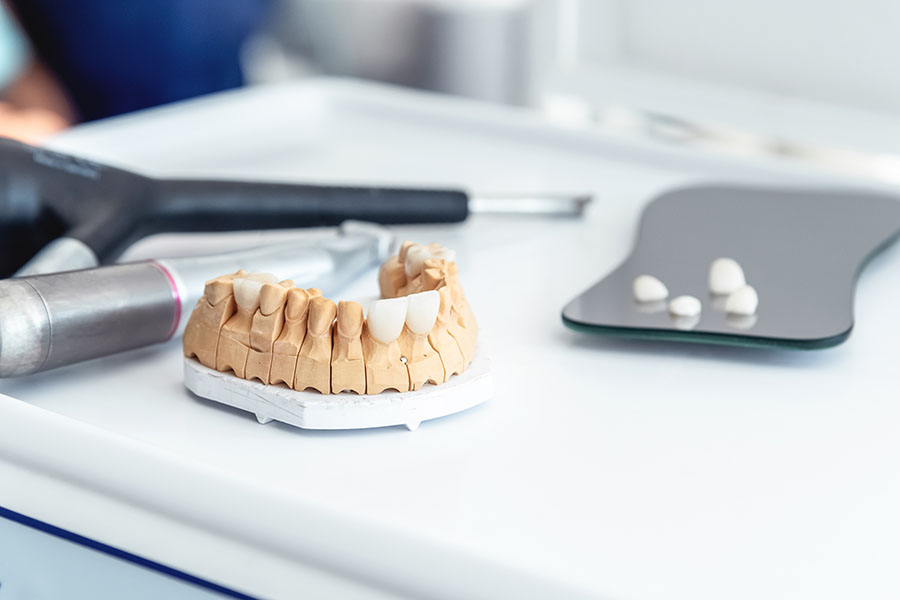Even with the best oral hygiene routine, tooth decay and damage will likely happen to each of us over time.
When this happens, dentists can use a number of methods to repair and restore damaged teeth, ranging from minimally invasive to full-scale dental implants.
One of these methods, dental crowns, gives patients the chance to avoid serious tooth decay, without the need for expensive maintenance or complicated aftercare.
What are dental crowns?
To put it simply, dental crowns are a type of coverage that your dentist can place over a damaged tooth to prevent it from worsening.
Typically made like a tooth-shaped cap, dental crowns help to strengthen the health of your smile and keep teeth in their natural alignment so that you can get back to living without the worry of long-term tooth decay.
Your dentist may recommend a dental crown to treat…
- Teeth that have weakened either due to natural decay, injury, or another ailment
- Cracked teeth or teeth that have been drastically worn down from grinding or chewing on hard objects
- Old fillings that have become ineffective, but don’t have enough tooth less to replace
- Masking the visible signs of dental implants or root canal treatments
- Restoring healthy teeth that have become discolored
Whether your dental concerns are health-based or cosmetic-replated, dental crowns are an easy solution for putting a smile back on your face.
What types of dental crowns are there?
In most cases, there are two types of crowns that your dentist will use to repair damaged teeth: ceramic and porcelain.
Both types of crowns are highly effective for treating a variety of oral health issues but also come with their own unique set of pros and cons.
Here’s what you need to choose the best dental crown for you…
Ceramic Dental Crowns
One popular material for covering damaged teeth is ceramic.
These crowns are typically molded from a type of ceramic clay and can be an aesthetically pleasing alternative to old-school metal crowns, especially if the patient receiving treatment has any metal allergies.
Ceramic crowns can be easily applied in just one appointment and are relatively low-maintenance, as long as you continue to practice good oral hygiene after having your crown in place.
Pros Vs. Cons of Ceramic Dental Crowns
Pros:
- Made to match the natural tooth color, making it a good choice for damaged front teeth
- Highly durable with a low risk of cracking or chipping over time
- Easy to care for with proper dental hygiene habits
- Can be customized to fit perfectly on your unique tooth shape
Cons:
- Require the care of an experienced dental professional to be applied properly
- Less affordable than metal crown options
- May wear down the surrounding teeth over time
- Less long-term strength than fused-to-metal crowns
Ultimately, all-ceramic crowns are a great way to treat and cover damaged teeth without obvious dental appliances, as long as you can afford to work with a qualified dentist for your treatment.
Porcelain Dental Crowns
In many cases, you may hear ceramic and porcelain crowns referred to interchangeably since the majority of ceramic crowns are made using porcelain.
However, there are actually some key differences that set these types of crowns apart.
One of the main factors is the ability to use porcelain-fused-to-metal to create a more durable crown that can last significantly longer than ceramic crowns. This procedure will require the tooth being treated to be trimmed down, which may cause complications if future treatments are necessary.
Like ceramics, these crowns can be formed to fit snuggly on the affected tooth and are relatively easy to care for over time.
Pros Vs. Cons of Porcelain Dental Crowns
Pros:
- Made to match natural tooth color, making them a good choice for damaged front teeth
- Can be made more durable with porcelain-fused-to-metal options
- Easy to care for with good oral hygiene habits
- Can be customized to perfectly fit your tooth shape
- Less likely to wear down surrounding teeth than all-ceramic crowns
Cons:
- Metal fusing can trigger allergies in some patients
- May cause increased tooth sensitivity if not applied by an experienced dentist
- Less affordable than all-metal crowns
- Requires the original tooth to be shaved down significantly
If you’re looking for an ultra-durable tooth covering that won’t be visible to the naked eye, then porcelain or porcelain-fused-to-metal dental crowns are a great way to meet your dental health goals.
How to pick the right crown for your smile?
We understand that dealing with a cracked or damaged tooth can be a stressful experience.
That’s why Dr. Smith and the caring team at Easy Valley Dental Professionals are committed to helping you understand your dental crown options so that you can restore your smile with confidence.
We’re here to guide you through every step of the dental crown process and are happy to answer any questions you have about potential treatments.
Contact our office at (430) 838-3033 to schedule an appointment today.

